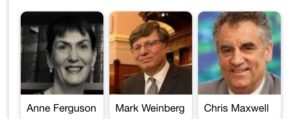An Own Goal in the Pell Appeal Hearing
The Streaming of the Appeal
The Victorian Court of Appeal is to be commended for streaming the entire hearing of Cardinal Pell’s appeal against conviction. It should ensure that any discussions and criticisms are based on what we saw rather than what we read, heard or saw from someone else.
The vision was confined to the 3 Justices hearing this appeal. Presiding, was the Chief Justice of the Victorian Supreme Court Anne Ferguson. The other two judges were Justice Chris Maxwell, the President of the Court of Appeal, and Justice Mark Weinberg.
 Visually, they presented a contrasting view of appeal judges. The Chief Justice was the picture of concentration, unchanging facial expression, and largely silent. The President was an active and enthusiastic asker of questions, often with a smile on his face. Justice Weinberg was comfortable slouched, frequently asking questions in a very relaxed but serious manner. I wondered whether the level of politeness and assistance given to Counsel was at least in part due to the presence of recording cameras and the world-wide viewers.
Visually, they presented a contrasting view of appeal judges. The Chief Justice was the picture of concentration, unchanging facial expression, and largely silent. The President was an active and enthusiastic asker of questions, often with a smile on his face. Justice Weinberg was comfortable slouched, frequently asking questions in a very relaxed but serious manner. I wondered whether the level of politeness and assistance given to Counsel was at least in part due to the presence of recording cameras and the world-wide viewers.
Coverage Too Restricted
Restricting camera coverage to those on the judicial bench made great sense in the broadcast of the Sentencing. However, this appeal hearing, for much of the time, left viewers looking at judges while hearing arguments and submissions by Defence Counsel and Crown Prosecutors.
Day One
On the first day of this 2 day appeal, Pell’s Defence Counsel, Brett Walker S.C. presented oral argument and answered questions from the judges regarding the grounds of appeal.
It is important to note that both sides had already submitted their written submissions. David Marr has written an excellent review of the first day’s hearings. Having watched some of that day’s proceedings, I found myself largely in agreement with his assessment.
Two Concerns
However, two matters concerned me about the process.
Firstly, I was not as impressed with the overall process (On both days). I’m of the view that having submitted detailed written submissions, any clarification should not take anywhere near a day for each side. Strict and brief time limits tend to focus arguments. This is in contrast to the rambling and repetition of arguments on both days.
Secondly, The performance of Defence Counsel Walker. came across as being overly smug. He was given far too much deference and latitude by the Court. Surely a less prominent barrister would not have been permitted to speak over judges.
Day Two
Today, the Crown presented arguments for preserving the jury verdict. I had looked forward to watching this part of the hearing, But was left angry and disappointed.
I watched most of the afternoon’s submissions by Senior Crown Prosecutor, Chris Boyce. With twenty years of experience as Defence Counsel, specialising in Court of Appeal Hearings and 3 as Senior Crown Prosecutor, and having been appointed Senior Counsel (the current Victorian equivalent of Queen’s Counsel, he must be a competent barrister. This was not evident today.
Virtually all his sentences were stuttered and included one or more ums. Many sentences were incomplete. His tone lacked any conviction or authority. Worse, still, he appeared unprepared. Audible whispers suggested that he was being prompted on the most basic of matters.
His arguments were poorly structured, and questions by the judges often ended up being answered by them. His unclear and poorly structured arguments were repeatedly rescued by the judges helpful ‘What you’re trying to say…’ to which Boyce would either hesitate to answer or simply quietly say ‘yes’.
For someone with so many years of experience he often addressed judges with the inappropriate ‘you’ and at one stage even answered a question with a question. Concluding arguments with ‘That’s what I want to say’ was amateurish, to say the least.
A point discussed at some length by the Court and Walker yesterday was whether in view of the availability of video recordings of witness statements, the Court still needed to keep in mind as traditionally required, that Appeal Courts do not have the advantages the jury has in forming a view about the evidence. Yet, Boyce, had apparently not given this issue any thought. When repeatedly asked to express his view on this important issue, he couldn’t, despite prompts from the judges.
In one of his most embarassing answers, when asked to comment on public confidence in a jury verdict, he said that this was something he had been taught in law school.
Own Goal
I cannot escape the conclusion that if Pell succeeds in his appeal, he will do so, thanks in part, to the bumbling performance by Chris Bryce S.C.